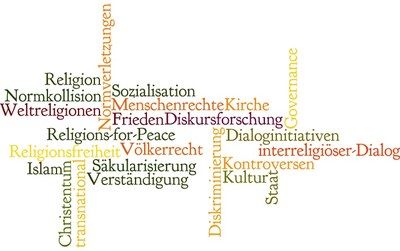Project Description
Here you will find a brief description of the project
Head of Project: Prof. Dr. Helmut Breitmeier
Staff: M.A. Farhood Badri, M.A. Julia Drubel, M.Litt Christopher Finke
Status: ongoing
An abbreviated version of this project's proposal outline can be found here as well as informations regarding the funding.
Abstract:
The global norm of religious freedom is an inalienable Human Right, whose global compliance varies strongly: While in some states the norm is considered to be implemented, norm violations are ranging from discriminatory tendencies in Western democracies to massive persecution in authoritarian regimes. The common means of which norm- and compliance-scholarship assumes to have leverage on strengthening the adherence to international norms (compulsion, cost-benefit, jurisdiction, shaming, learning), only have limited effect on the realization of religious freedom, whereby socialization strategies which focus on norm internalization through persuasion, are most likely to be effective. The substantially innovative contribution of this project lies in the application and extension of the central results of norm and compliance studies on a culturally disputed norm, which is characterized by societal controversies as well as in international law regarding its specific interpretation. Furthermore this project incorporates discourse research into its methodological design, which is why the research question of this project is, whether, how and under which circumstances transnational interreligious dialogue between the representatives of the world religions Christianity and Islam lead to agreement over scope (norm components) and range (addressed audience) of the norm of religious freedom.
The primary goal shall be to detect which influences originate from interreligious dialogue, through which causal mechanisms and action logics they act and whether at all they contribute to an understanding over controversial norm contents. With regards to content, the project pursues the following sub-goals: 1. a 
It is not this project’s goal to examine the compliance of religious freedom on the nation-state level. Nonetheless it must be assumed that interreligious dialogue represents a complementary governance mode which doesn't replace the intergovernmental governance, but perhaps contributes to an improvement in norm compliance. Furthermore this project openly encounters the possibility that interreligious dialogue initiatives may have a debilitating or disruptive effect on the compliance of the norm. Based on the implementation of the qualitative analysis within selected case studies of the four initiatives A Common Word, UN Alliance of Civilizations, Religions for Peace and International Association for Religious Freedom there shall be an empirical examination of the capabilities and boundaries of the compliance of interreligious dialogue initiatives regarding religious freedom.
